i burst into tears yesterday over a passage (no, actually, it was a list in the sidebar) in the book i’m reading on asperger’s and parenting. the heading of the sidebar was behavioral manifestations of anxiety. all sixteen of the listed items applied to quinn. i hadn’t fully understood all sixteen of them as manifestations of anxiety, though, until i saw them all listed in one place like that. it has me experiencing a little anxiety myself, but i’m going to keep breathing and keep reading and see what i can learn. come along with me as i process…
one of the bits i keep hearing from professionals and books is that aspies engage in a lot of black-and-white thinking, and that abstract concepts are hard for them. quinn has his moments of being able to hang with abstract concepts, but he does often take things quite literally, he does often see only either/or options and fail to see the many alternative solutions to a problem, and he expects to be perfect at what he does, which is yet another form of black-and-white thinking. this book (parenting your asperger child, by sohn and grayson) is saying that the black-and-white thinking arises from anxiety, especially that caused by difficulty with understanding the world around him.
the book approaches things from a different parenting paradigm than the one i inhabit. trying to find a frame of reference for what we are experiencing compared to neurotypical children, to determine if quinn is other than neurotypical, i can find very little in the book to help me. when there is a list of motivations behind the behaviors of an asperger child, the afterthought is that these anxiety-driven motivations set the behaviors apart from those that are merely attention-seeking or “just plain misbehavior”; is that what the authors believe is more likely the motivation behind neurotypical children’s problem behaviors? that has never been my worldview. i’m more aligned with a ya-ya sisterhood view of children:
just what if god didn’t intend for everything to be perfect? what if he knew it was going to be a holy mess, and he loved us anyway? what if adam and eve weren’t sinning? what if that prenatal original sin stain on our souls is not even there?
…when my boys were born, i looked at each one of them and said NO to that original sin shit. i looked at my babies and thought, you are pure, holy, perfect, complete and undefiled. and nobody can tell me different, not the pope his royal self. believe it now.
i’m reading ya-yas in bloom, by rebecca wells, to balance out my asperger parenting manual. i believe that children are innately good, that they want to belong and behave and thrive and are driven to do so by their own fully intact inner nature. i have never been a believer in “he’s just doing that to get attention” or rather, when children seek attention, i think they should be given attention. and i couldn’t resist the timeliness of the quote about the pope.
and i wouldn’t be doing my worldview justice if i didn’t mention ani:
when i was four years old they tried to test my i.q. they showed me a picture of 3 oranges and a pear they said, which one is different? it does not belong they taught me different is wrong
the only other line (back to the non-fiction title now – sorry to jump around) that gives a frame of reference so far briefly mentions that the behaviors in an aspie might be more of the same you’d see with any other child, the difference being a matter of degree, intensity, or frequency. leaving me still searching for a frame of reference, alas.
i have been mindful of eliminating expectations from my life in an effort to reduce my own tendency to be uptight and resentful when things don’t turn out to match my search image. it helps me go with the flow to show up with a blank slate and discover the boy who is in front of me. if i had a real clear expectation in my mind of what a six year old boy was supposed to be like, and could clearly see how we deviated from that set of expectations, i might have a better grasp of this label business. i have a grasp of who quinn is, but not how he compares. i have a really deep sense of what makes him tick, and when i read lists of reasons for rigidity in an aspergian child, and can check off every single one of them for things i see quinn reacting to, i turn the page looking for how this is a deviation from a neurotypical approach. are nt kids never rigid? if they are sometimes rigid, is it because of the same motivating factors like fearing change and not understanding intuitively how a certain interaction is usually done? is it the same as nt behavioral motivations, only more intense? am i just over in some other city in italy, or am i way over in holland? i guess i am looking for the authors to state what must to them be the obvious.
i still think the book has something to offer in terms of strategies for introducing more flexibility when a child becomes rigid, and showing him how to see more middle ground, more gray areas.
let’s say, for example, that you have a list of guiding principles that you have developed together and discussed over time:
- safe
- gentle
- honest (this is a newer one we’ve recently added to the list)
- golden rule- treat others as you would like them to treat you.
and say you are working pretty hard on helping your son remember to be honest: even when you think we want to hear “yes” when we ask if you brushed your teeth, we want you to tell us “no” if no is the true answer. however (****gray area alert!!!****), there are things people keep in their head and are not technically honest about, like when you like the store waffles better than your mama’s homemade ones.
the one thing that really hits home for me in the published strategies for handling skill-teaching with asperger’s children is the need to take things step by step and explain even things that seem obvious. the idea is, there are things that are obvious to many of us that are a complete mystery to someone with asperger’s. quinn often needs things spelled out. there are many messages we receive that are subtly implied, things we just “take in”, that an aspergian is not “taking in”- they are not reading between the lines the same way that most of us are. if that makes him sound slow on the uptake then i am doing him a disservice with my words- quite the contrary, he can be told once and have something memorized for life, but if it’s delivered in the wrong packaging, he may never receive it, even if he is told a thousand times.
of course, there are things all children need to be told a thousand times.
it’s working out well for us because one of my conclusions about parenting early on was that it always seemed to help to state the obvious with quinn. i began doing this when he was very young and experiencing strong emotions, and whenever he did cry or get angry, i would name the feeling he was having out loud. “you’re feeling sad. you didn’t want to stop playing with that.” i think this is helpful in building any child’s emotional intelligence, but with quinn, in retrospect, it might be the reason he has an emotional iq at all. it is one of the many ways he doesn’t fit the aspergian mold: he can name his feelings. he still has a hard time understanding what other people are feeling. are there are lot of six year old boys who are experts at this?
sometimes i think maybe he is an aspergian with a lot of neurotypical quirks he has developed from having a quirky mama.
thanks for reading along while i process. i’m so grateful for all the thought-provoking comments and emails i’ve gotten about all of this, and as always would love to hear your thoughts, ideas, further reading recommendations, etc. have a great weekend!
p.s. experiencing driftwood block envy? go here.
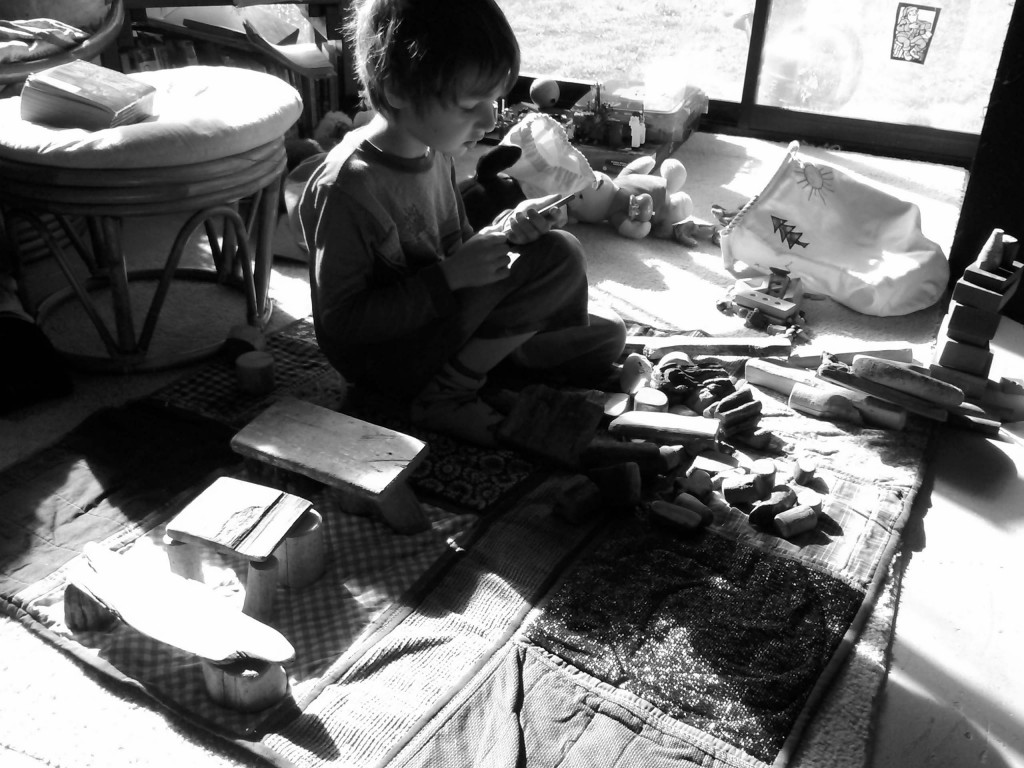
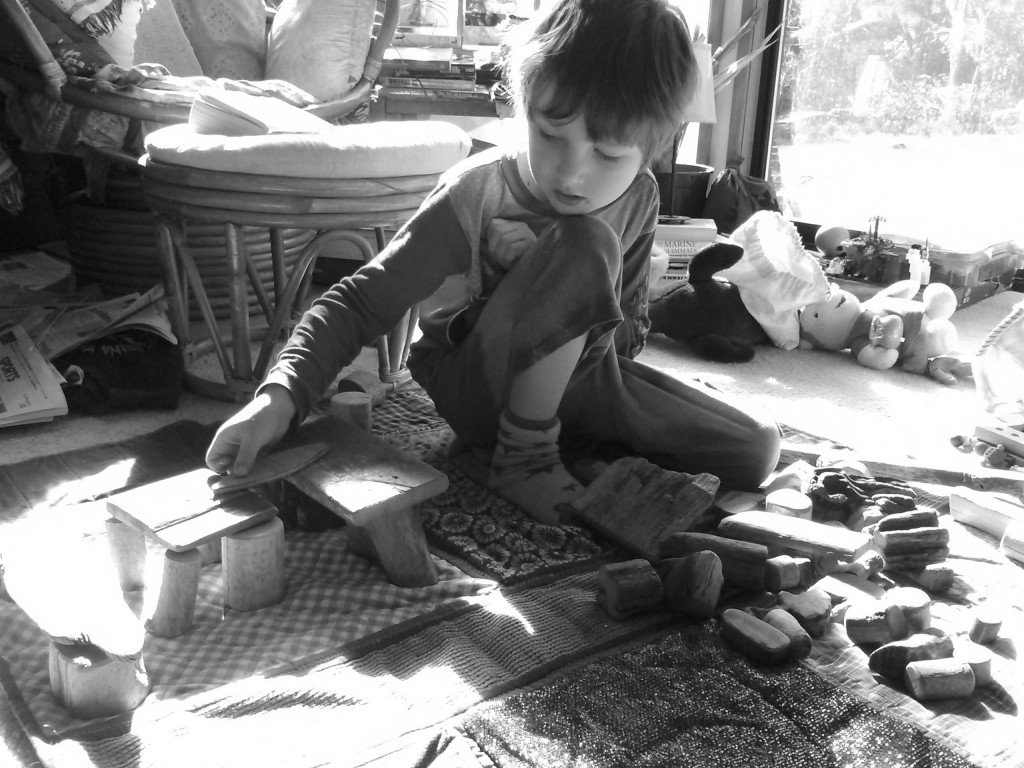


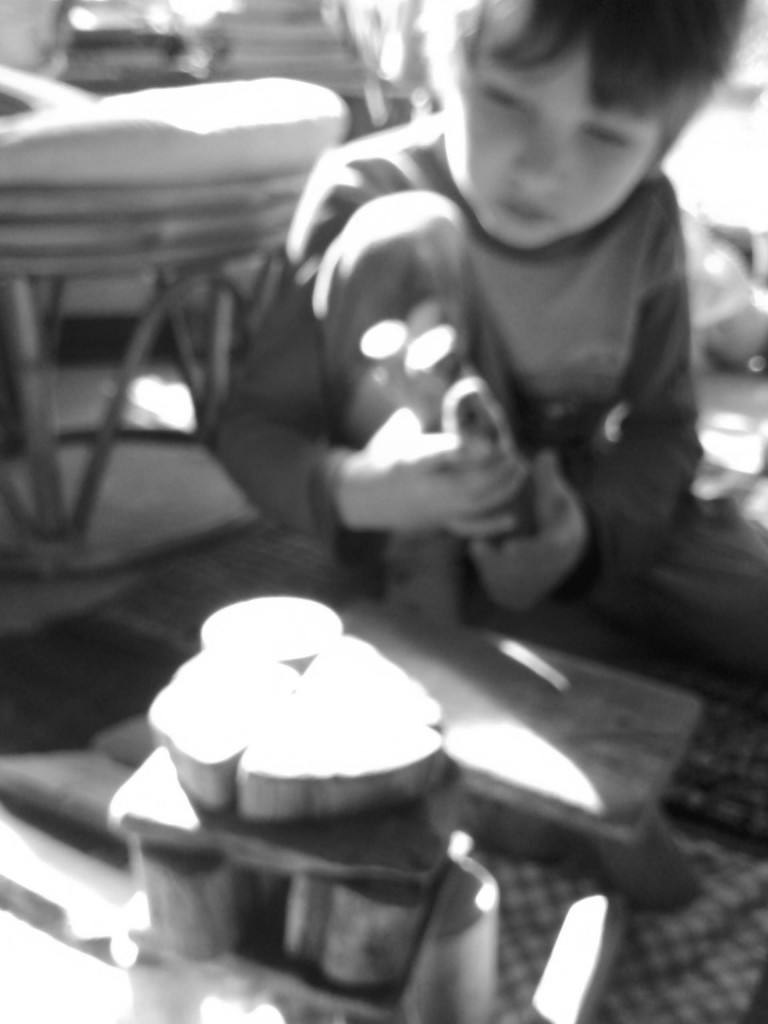


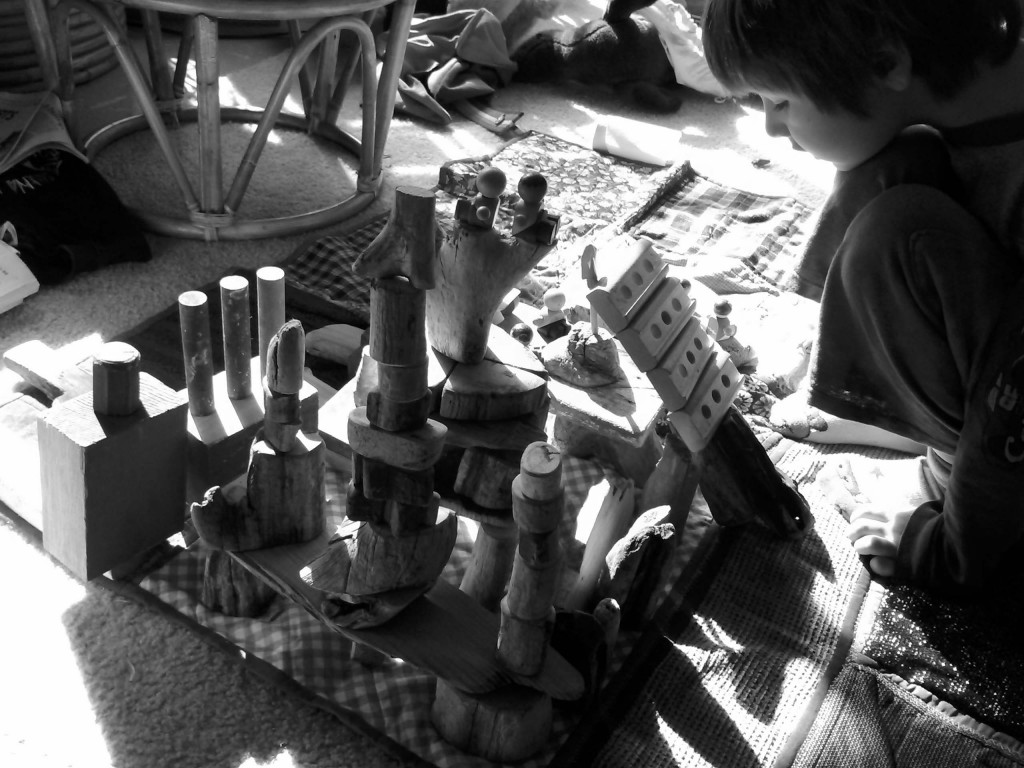
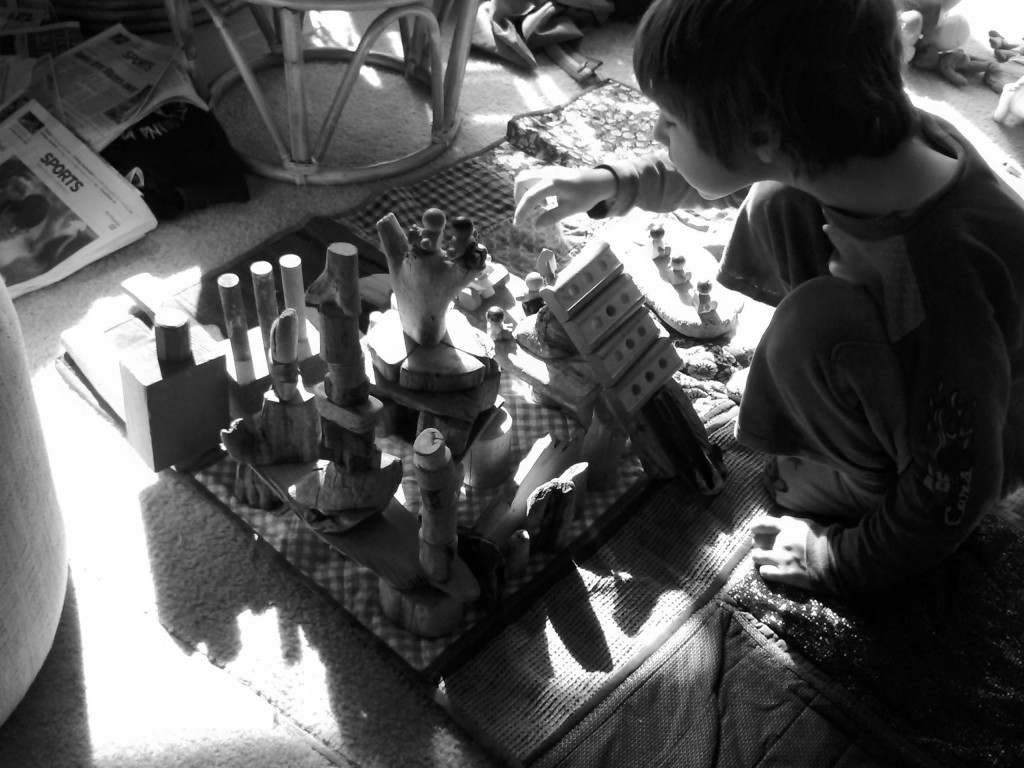















Hey there MB,
You know, a lot of times when you write about Quinn’s attributes that may suggest he is not neuro-typical, I think, “Talan acts that way sometimes, too.” (or a lot of the time depending 🙂 But I’m pretty sure he is nt. It makes me think maybe it is “normal” child development/behavior that is more intense. Or maybe it is a combination of all the things together. Anyhoo, just as a reference point, my kids def show some of the same behaviors, some of the time. Probably often with similar motivations. So what makes it cross that threshold into not typical? Well, I don’t know. And does it matter? I don’t know that one either. I guess it matters if you can help your child live a better, more fulfilling life by figuring out that some of their needs are different than nt children. But you were doing pretty good at figuring out Quinn’s needs anyway, seems like. I guess you can’t expect all of society, schools, etc, to figure out his needs, which is where a diagnosis might be helpful in some situations. Okay, ramblings done, can’t wait to see you guys soonish!
I see what you mean, I think, around the discussion of the motivations behind the behaviors, and the (apparent?) assumptions the authors make about the motivations behind similar behaviors in neurotypical kids, and how that paradigm doesn’t really fit or compute. Perhaps it’s a matter of really “getting” the needs-based reasons or “motivations” for behaviors in specific kids quite well, (and thus having some value or merit), but making unfounded assumptions in the process. I have seen that in a variety of contexts (both “within” & “without,” I think) in connection-oriented parenting. Like, advocates of a love-based (non-coercive, unconditional) approach for their adopted or foster children with trauma histories will review a book like “Beyond Consequences, Logic & Control” and say things about how ‘normal’ parenting methods (behavioral focus, consequences, rules) that worked fine for their other children just didn’t work for children dealing with traumatic histories. And I’ve heard parents mention that they couldn’t parent a child with autism the “normal” way (and they describe a parenting approach that, in my opinion, would be healthier or more desirable for ANY child.) So these distinctions seem common, but not necessarily “warranted” by anything more than expectations or assumptions.
I was wondering if you might like reading some of what Dan Siegel has to say about obsessive-compulsive behaviors & anxiety, and about working with clients (including younger ones) who are affected by these things. I can only think of the book Mindsight right now.
Also, about rigidity. I think there’s a lot there (in that topic.) I do think neurotypical kids can get rigid. lol I also think it can be a signal, rather than (necessarily) a “trait.” Sometimes it is recurring with regularity, but my thought is that, evenso, it’s a signal. (Signaling fear, or the need/readiness to offload some emotional baggage.) I would not discount your boy’s NICU beginnings, I’d say. Very early fear (birth trauma, medical trauma, separations, etc.) that precedes language is “implicit memory” and I believe it’s a big factor in human functioning. I am trying to think….I know there’s a blogger (he’s a psychologist/therapist) who has written some about this….and there’s the “Aware Baby” or “Aware Parenting” material. Anyway, I think unresolved trauma (or simply speaking, stored fear) drives a lot of rigid behaviors & “control patterns” for keeping the feelings safely stores. (“Safely” not to be confused with what is emotional healthy or optimal, just what feels safe to the person who is busy coping.) Intensity around nursing would be one common “control pattern.” (I think Aletha Solter of Aware Baby/Parenting uses that term; I haven’t heard it used elsewhere. You could think of a control pattern as a coping mechanism, or some kind of substitution or distraction, an escape. A behavior driven by anxiety that is self-protective in function but essentially rigid. I would say the idea is that it’s not really reflecting a need itself–a need to nurse–but it reflects an intense feeling of need, and of course the behavior is driven by a surge of anxiety, so it is need-based in that sense.)
I do believe I inadvertently “got in the way of” emotional release for my children with my pattern of offering nursing, especially with my first baby. (I also am not sure how, at the time, it could have been different for me & also have been more connected/positive. I mean, I see how much of my practice of “attachment parenting” was anxiety-driven, but I think that was what I could manage. I don’t think I could comfortably be with my child’s crying without being agitated or disconnected. Which would NOT have been an improvement.)
Anyway, not sure where I was going. Loved your b/w photo sequence. Have been reading along & meaning to post comments for awhile, but decided to start with this beautiful post of yours, tonight. xoxo
P.S. Above I meant that when some parents mention how they parent their child with autism in a way that is so different than the “normal” way of parenting, this different way they describe sounds like a healthier & more desirable approach to parenting, period! (I don’t think I stated it clearly.)
oh, i understood what you meant. i guess i have had a lot of practice discussing these parenting matters with you, though, amy. 🙂 i am looking up dan siegel and aleta solter now. i\’m feeling like i need to just keep an open mind right now… yes, quinn\’s nicu week is certainly one thing that comes to mind for me when i can tell whatever he is upset about isn\’t really \”the\” upset but something he can point at and be upset about. i don\’t know if that makes sense- but knowing there is something deeper in him that he can\’t articulate, and instead choosing to emote about something right in front of him (even though it might seem absurd to be upset about that thing.)
right now i\’m mulling over the dichotomy between mental health and neurological health, and wondering how it is that professionals can place a set of characteristics on one side or the other of that line. particularly when i believe in neural plasticity, believing that things that happen to us can change our neurology, and then also that work we do on ourselves can change it back or change it forward in other positive ways, i often get the sense the mental/neurological is a false dichotomy. \”asperger\’s is a medical diagnosis, not a mental health diagnosis\”. um, ok, but so far all we have seen are mental health professionals, and that is because of behaviors that would signal something to a mental health professional. sure, these same behaviors might have meaning for a neurologist (or a developmental neural pediatrician!) but i guess i\’m just wondering why we need it to be so either/or, and i think if we all could cross disciplines more and collaborate we\’d probably find much better ways of helping kids with stuff like asperger\’s. hm. not sure where i\’m going with this.
anyway amy, i wanted to say i totally appreciate your words here and that you always give me so much mind-opening and thought-provoking stuff to think about. xoxoxo
Mb, what is the title of the nonfiction book about aspergers and parenting that you are reading?
parenting your asperger\’s child. i will have to get back to you on the author, sohn i think is one of them. i mentioned the title in a post a while back…
[…] for teaching your child practical skills by allan sohn and cathy grayson (i wrote a bit here and here about this […]